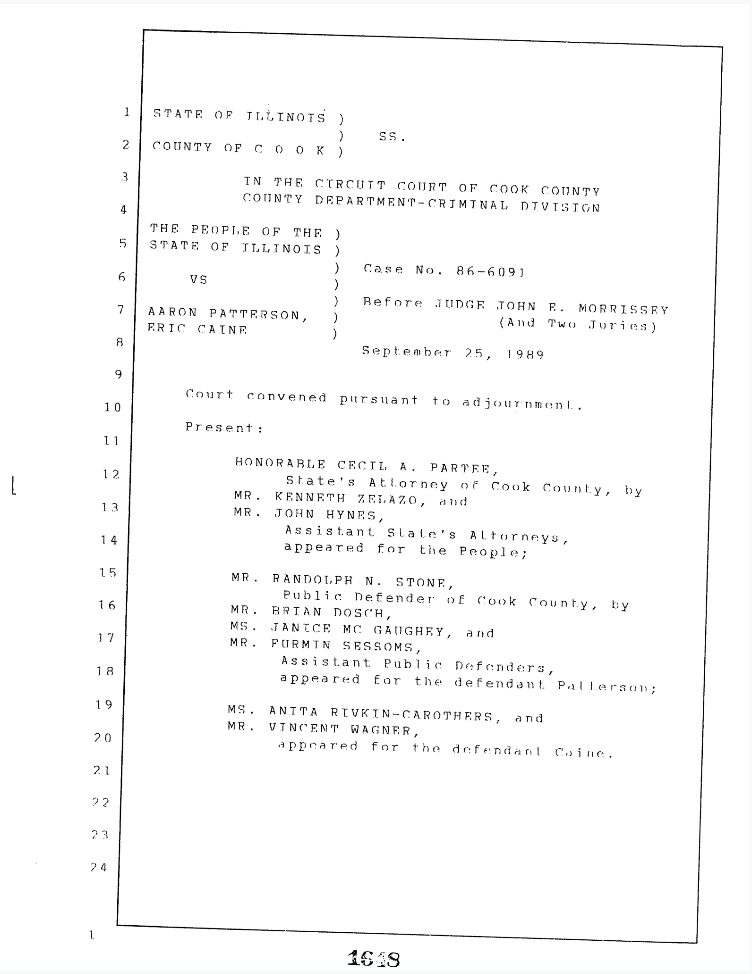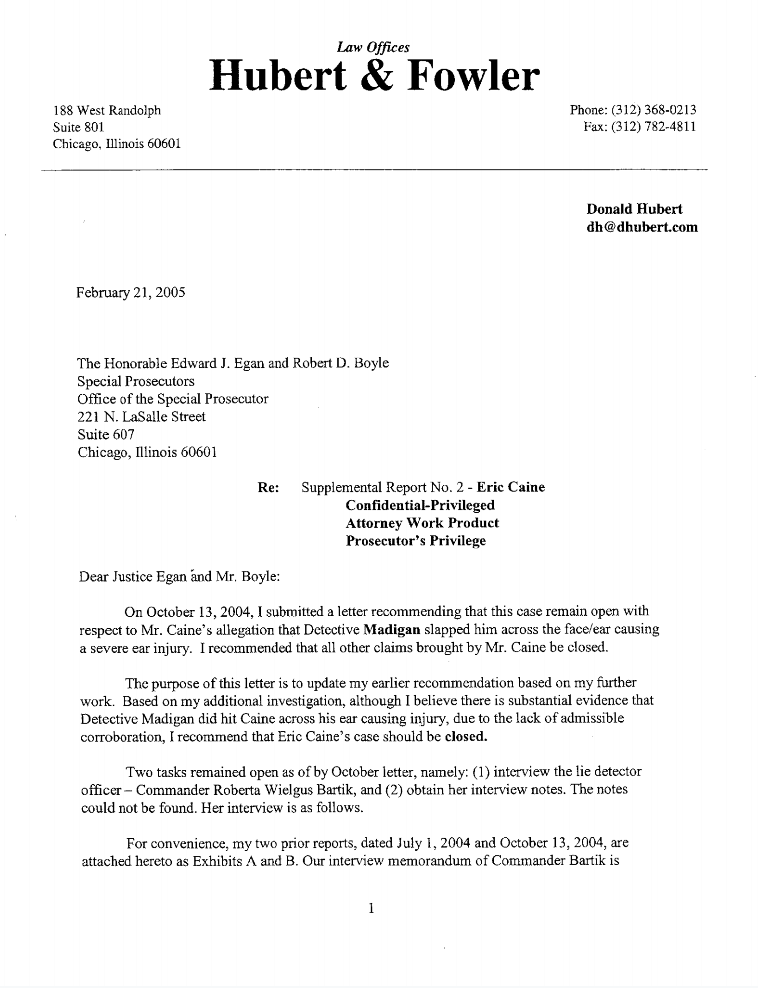The following profile has been republished with permission from The National Registry of Exonerations.
Eric Caine, 24, and Aaron Patterson, 25, were tried together in 1989 and convicted by separate juries of stabbing an elderly couple to death on the South Side of Chicago.
The mutilated bodies of the victims—Vincent Sanchez, 73, and his wife, Rafaela, 62—were found in their home on April 19, 1986. Caine and Patterson were arrested 11 days later after a 15-year-old girl claimed that Patterson had admitted the murders and a neighbor claimed to have seen Caine across the street from the Sanchez home around the time of the crime.
Tortured by police
Detectives who were proven to have routinely tortured African American criminal suspects promptly obtained confessions from both men. Before their joint trial, Caine and Patterson moved to dismiss their confessions on the ground that they had been tortured. Caine testified that a detective told him that Patterson, the son of a Chicago police officer, already had confessed that he and Caine had gone to the Sanchez home intent on finding weapons. When the couple would not give up the weapons, Patterson began stabbing them and Caine ran. When he refused to go along with Patterson’s story, Caine testified, he was beaten and then taken to see Patterson, who had been so badly beaten that he could barely speak. Caine signed a confession.
Patterson was given a written statement to read and left alone, chained to a hoop on the wall of an interrogation room. With a paperclip, he scratched a message onto a metal bench: “Police threaten me with violence. Slapped and suffocated me with plastic. No lawyer or dad. Sign false statement to murders.”
Sentenced to life
Judge John E. Morrissey denied the motion to suppress the confessions and the defendants’ separate juries found both men guilty. Patterson was sentenced to death and Caine to life in prison.
Caine and Patterson lost various appeals until 2000, when the Illinois Supreme Court belatedly recognized in Patterson’s case that “substantial new evidence supports defendant’s claim that his confession was the result of police brutality,” and ordered the evidentiary hearing on Patterson’s torture allegations. At that point, the young woman who, at age 15, had implicated Patterson in the murders, admitted that she had lied to protect her cousin, who had been an alternative suspect in the case.
Caine and Patterson seek governor’s pardon
Patterson’s attorney, G. Flint Taylor, Jr., filed a petition seeking a gubernatorial pardon based on innocence, which Governor George H. Ryan granted on January 10, 2003, freeing Patterson. In 2007, a federal civil rights suit brought against the police by Patterson was settled for $5 million.
Also in 2007, Patterson was sentenced to 30 years in prison after being convicted in federal court of gun and drug charges.
Caine, however, was not pardoned because he “only” received a life sentence.
In 2009, the Exoneration Project at the University of Chicago’s School of Law filed an Amended Petition for Post-Conviction Relief, asserting that Caine’s confession was coerced and introducing new evidence of misconduct by the officers who interrogated him. The petition also introduced new evidence identifying the true perpetrators.
On March 16, 2011, 25 years after his conviction, the state of Illinois dismissed all charges against Caine and Cook County Circuit Court Judge William Hooks ordered his release. Caine was released the following day—the same day that former Chicago Police Lieutenant Jon Burge, who had led the police unit that tortured Patterson, Caine, and many others, entered prison after being found guilty of perjury and obstruction of justice related to the torture of criminal suspects.
— Written by the Center on Wrongful Convictions
Journalist Amanda Rivkin interviewed Eric Caine in 2015:
“Before then, I thought I knew fear,” Caine said about his 1986 arrest and torture at the hands of Chicago police. But, looking back, he points to that night and morning in custody as when he learned what real fear is. “Fear can make you do things that you wouldn’t imagine,” he said. Caine said that’s why he agreed to go along with the story police officers told him even though it meant admitting to a crime he did not do.
In prison, Caine said he spent years angry at himself for his confession. “Why would I admit to doing something that I knew I had nothing to do with,” he said, “I don’t even think to this very day that I have forgiven myself for that.” He went on to describe the hardest part about prison for him was “not being able to accept the fact that my life was meant to end this way.” Eventually, Caine said he started teaching himself criminal law, filing his own appeals, and reaching out to attorneys for help with his case.
In the years following his release from prison, Caine said his biggest challenge has been learning how to cope. “I never learned how to be grown,” he said about leaving prison in his mid 40s and figuring out how to be a responsible adult.
On top of these challenges, Caine said that since his release, he’s felt like he’s been living under a microscope and that law enforcement is constantly looking for a reason to arrest him.
“I know they would take any opportunity, any chance, anything that comes up to try to either put me back where they really believe I belong or to somehow redeem themselves,” he said, “but the fact of the matter is, I was never that kind of guy in the first place.”






